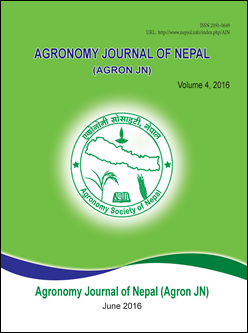Consequences of Climate Change In Agriculture and Ways to Cope Up Its Effect In Nepal
DOI:
https://doi.org/10.3126/ajn.v4i0.15514Keywords:
Climate change, Adaptation, Global agriculture, Food securityAbstract
Nepal is one of the four most vulnerable countries affected by climate change in the world. Climate change has been occurred in Terai, hills and mountain of Nepal resulting change in agriculture systems. Global food production of major staples crops of rice, maize, wheat and soybean, and marine resources are decreasing. Nepal is blessed with number of natural flora and fauna which could address negative impact of climate change resulting food and nutritional insecurity. Emphasis should be given to develop technologies address negative impact of climate change. Nepal has been trying to develop some adoptive ways such as development of climate resilient technology encompassing crop varieties, animal breeds; agronomic practices that could address vagaries of climate change and sustain food and nutritional security. In Nepal, the effect of climate change is more pronounced in hills and mountains with respect to increase in temperature than that of Terai. In this paper, bird’s eye views on issues of climate change, negative impact of climate change on food and nutritional security and coping mechanisms to tackle all of such concerns of climate change in agriculture in general and food and nutritional security in particular have been illustrated in ways climate change could be addressed to limit its negative consequences on agriculture as well.
Agronomy Journal of Nepal (Agron JN) vol. 4, 2016, Page: 25-37
Downloads
Downloads
Published
How to Cite
Issue
Section
License
ASON permits for free use, distribution and reproduction in any medium if the original work is properly cited and not used for commercial purposes.




